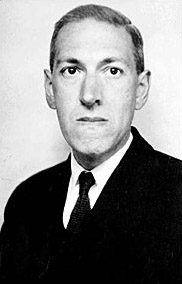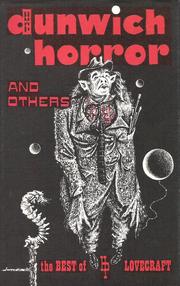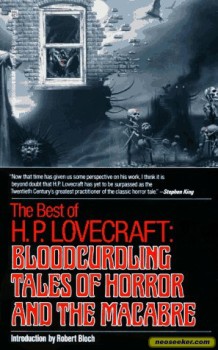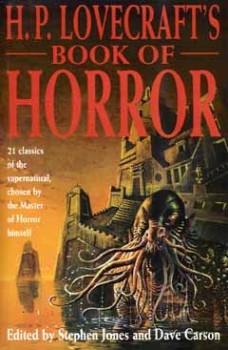So You’re a Horror Fan and You’ve Never Read…
H.P. LOVECRAFT?
 I sit here typing this while wearing a pirate hat and wig of long, black dreadlocks. Why this should be I feel inadequate to formulate into words, lest my attempt to do so come across as the disjointed jargon of a dullard. I will say this, though: I have seen the gibbous moon in lonely places; I have crossed putrid moats under dark mute trees to survey strange runes left by long-lost races, runes undoubtedly concealing eldritch secrets long buried in the muck inhabited by fat mottled sea-worms, secrets that would drive one insane, insane I tell you. So I thought I’d launch this week the first installment of an occasional series called “So You’re a Horror Fan and You Haven’t Read…[author]?”.
I sit here typing this while wearing a pirate hat and wig of long, black dreadlocks. Why this should be I feel inadequate to formulate into words, lest my attempt to do so come across as the disjointed jargon of a dullard. I will say this, though: I have seen the gibbous moon in lonely places; I have crossed putrid moats under dark mute trees to survey strange runes left by long-lost races, runes undoubtedly concealing eldritch secrets long buried in the muck inhabited by fat mottled sea-worms, secrets that would drive one insane, insane I tell you. So I thought I’d launch this week the first installment of an occasional series called “So You’re a Horror Fan and You Haven’t Read…[author]?”.
Howard Phillips Lovecraft (1890-1937) was almost lost to the crumbling pages of pulp magazines. Even after a book-publishing imprint (Arkham House) was created for the sole purpose (initially) of preserving his work, he remained pretty obscure outside of a small cult following for decades.
Lovecraft would undoubtedly appreciate the irony of himself having a following called a “cult,” and it did not hurt his cred that many among that cult would go on to be among the most influential creators of pop culture in the twentieth century, especially in horror cinema (Lovecraft’s influence really became well-known to a mainstream audience first through film, via folks like H.R. Giger [designer of the eponymous Alien in the Alien films] and director Sam Raimi [Evil Dead et al]. You may have never even heard his name, but if you grew up in the latter half of the twentieth century, Lovecraft’s influence pervaded the horror and science fiction you experienced).
When my generation met Lovecraft’s stories directly, we first did so through paperbacks with lurid, unsettling covers in the ‘80s and ‘90s, but today his work is collected in fine editions by The Library of America and in the “classics” imprints from the likes of Penguin and Barnes & Noble. As his cachet has risen, an inevitable debate has also arisen about whether he’s really all that good. Is he worthy of all that “important author” treatment he’s been getting or is he a hack unjustifiably granted “classic” stature? [See Endnote 1]
Jeffrey Ford (a writer whom I very much enjoy and admire!) recently confessed on his Facebook page that he doesn’t much care for Lovecraft. It reminded me of a topic that sometimes comes up among English majors when they’re having drinks and feeling confessional. “I’ve never read Paradise Lost,” one will admit. “I couldn’t get through Moby-Dick,” another counters. “Only got two chapters in to Ulysses,” someone else ups the ante. And so on, as these slightly buzzed arbiters of English literature seek absolution for their sins of omission. So, if you’re a serious scholar of speculative fiction, or just a big fan of horror, should you read Lovecraft? Are the frequent parodies of him on the mark?
 I mean, his prose — that prose, heavy with obscure adjectives and garish descriptions of squamous or mollusky creatures scuttling across fungoid landscapes beneath gibbous moons — sometimes it veers virtually into self-parody, right? His dialogue, when there is any, is all-too-often stilted or ventures into the melodramatic, no? When he really gets going, you can bet his narrator will claim something is indescribable and then proceed to describe it in a long paragraph of purple prose. And the big revelation at the end of a typical Lovecraft tale? Nine times out of ten, it will be delivered in a single dramatic sentence, in italics.
I mean, his prose — that prose, heavy with obscure adjectives and garish descriptions of squamous or mollusky creatures scuttling across fungoid landscapes beneath gibbous moons — sometimes it veers virtually into self-parody, right? His dialogue, when there is any, is all-too-often stilted or ventures into the melodramatic, no? When he really gets going, you can bet his narrator will claim something is indescribable and then proceed to describe it in a long paragraph of purple prose. And the big revelation at the end of a typical Lovecraft tale? Nine times out of ten, it will be delivered in a single dramatic sentence, in italics.
All of this is true. But before I get to why the correct answer to whether he is really such-a-much is “Yes, H.P. Lovecraft is indeed the most important horror writer of the twentieth century,” let me briefly address those criticisms of his prose style and get them out of the way.
Again, every joke about Lovecraft’s stylistic excesses is well-founded, guilty-as-charged, but while this style is certainly not part of what makes him great, it is part of his charm. Or, rather, part of his singular identity. What I mean is, no one else writes like Lovecraft unless they’re purposefully writing like Lovecraft. And virtually every spec-fic writer worth his salt has written a Lovecraft pastiche, usually (but not always) for laughs, from Stephen King to Neil Gaiman. The fact that one can immediately spot when an author is parodying Lovecraft — it can be mistaken for no other! — says something about the unique force of personality inherent in his style. You may hate the style, might find it tedious to slog through, but you’ve gotta admit it’s as recognizable as Hemingway or Joyce (not as good, mind you, but it is immediately identifiable as having been written by one particular person on the planet, or else by someone intentionally trying to sound like that person).
And why do so many writers pen Lovecraft parodies and pastiches? Because it’s damned entertaining. You can chuckle all you want at his turgid prose…just before your skin crawls at what it is he’s telling you.
“Lovecraft opened the way for me, as he had done for others before me — Robert Bloch, Fritz Leiber, and Ray Bradbury among them. The reader would do well to remember that it is his shadow, so long and gaunt, and his eyes, so dark and puritanical, which overlie almost all of the most important horror fiction that has come since.” – Stephen King
King is correct, but why? Why is Lovecraft the most important American horror writer since Poe (and I would say one of the three most important horror writers in U.S. history)?
It’s largely because of the following paragraph:
“The most merciful thing in the world, I think, is the inability of the human mind to correlate all its contents. We live on a placid island of ignorance in the midst of the black seas of infinity, and it was not meant that we should voyage far. The sciences, each straining in its own direction, have hitherto harmed us little; but some day the piecing together of dissociated knowledge will open up such terrifying vistas of reality, and of our frightful position therein, that we shall either go mad from the revelation or flee from the deadly light into the peace and safety of a new dark age.”– Lovecraft, “The Call of Cthulhu”
This changed the course of modern horror, elevated it to a new level for a new, scientific age.
 Lovecraft revealed an indifferent universe within which lurk nightmares and horrors, but he brought these from the human level of crypts and haunted attics to the level of nature above and beyond us. As many have noted before, Lovecraft created “cosmic horror.” That such horror seems so familiar, so unoriginal to young readers checking him out for the first time today quite frankly speaks to the pervasiveness of his influence. His pen is the progenitor of the monsters of Alien and Predator (and a thousand other horror/sci-fi films), as well as of the dread Necronomicon (which has been at least referenced, I would guess, in well over 100 films and television shows — I wonder if anyone has ever attempted to compile such allusions).
Lovecraft revealed an indifferent universe within which lurk nightmares and horrors, but he brought these from the human level of crypts and haunted attics to the level of nature above and beyond us. As many have noted before, Lovecraft created “cosmic horror.” That such horror seems so familiar, so unoriginal to young readers checking him out for the first time today quite frankly speaks to the pervasiveness of his influence. His pen is the progenitor of the monsters of Alien and Predator (and a thousand other horror/sci-fi films), as well as of the dread Necronomicon (which has been at least referenced, I would guess, in well over 100 films and television shows — I wonder if anyone has ever attempted to compile such allusions).
Granted, H.G. Wells played a hand in that sort of scientific horror, giving voice to our deepest fears about what might be waiting to pay us a visit from the infinite reaches of time and space, but Wells’s lineage is more squarely on the sci-fi and apocalypse side of the spectrum. Lovecraft was always focused in on kindling one emotion: FEAR.
Exhibit B. Read the first two pages of “The Dunwich Horror.” If you’ve got a Lovecraft collection sitting on your shelf nearby, go do it right now, then come back here. I’ll wait…
…Back? Okay, that is some scene setting there, my friend. If there is a more effectively atmospheric description of place — written purely to evoke vague dread of that place — I haven’t read it.
Unfortunately, I, like many of my fellow horror writers, have fallen into the Lovecraft trap from time to time. You read something like those opening paragraphs of “The Dunwich Horror,” culminating in “Afterward one sometimes learns that one has been through Dunwich” (can you imagine how innocuous that line would be if not preceded by the opening paragraphs? When it hits, though, it always gives me chills.). Then you think, “I want to do that.” What you get is a rejection letter from an editor saying, “We’re two pages into the story and you haven’t introduced a single character or even a hint at the plot.”
It reminds me of something I once read about art students at some prominent studio back in the ‘70s. The instructor noticed that all his students were trying to paint like Frank Frazetta. Frustrated, the instructor declared, “Quit trying to paint like him. There’s only one Frank Frazetta, and he’s it!” One could paraphrase, “There’s only one Lovecraft, and he’s it!” No one else can get away with that kind of an opening. Believe me, we’ve tried.
 Lovecraft also seems to be one of the first Americans to take a critical, scholarly interest in horror as literature. Indeed, his long essay “Supernatural Horror in Literature” is still a seminal text on the subject, if somewhat problematic (as the genre itself can be problematic, especially for literary criticism). It is there that he expounded his oft-quoted theory: “The oldest and strongest emotion of mankind is fear, and the oldest and strongest kind of fear is fear of the unknown.”
Lovecraft also seems to be one of the first Americans to take a critical, scholarly interest in horror as literature. Indeed, his long essay “Supernatural Horror in Literature” is still a seminal text on the subject, if somewhat problematic (as the genre itself can be problematic, especially for literary criticism). It is there that he expounded his oft-quoted theory: “The oldest and strongest emotion of mankind is fear, and the oldest and strongest kind of fear is fear of the unknown.”
So what is this “cosmic horror” all about, really — why was it so revolutionary? Well, look down the food chain and you see it is all about things eating other things, from the biggest carnivores all the way down to the smallest amoebas consuming each other on a microscope slide. Lovecraft substituted the microscope with a telescope, angled it skyward and posited that the food chain stretches up as well as down: that the gods, if they took any notice of us at all, would just as soon eat us as bless us. The universe itself may be indifferent, but everything in it wants to munch on everything else. The single most ubiquitous adaptation in the world is a gaping maw, lined with sharp teeth.
If you only read two Lovecraft stories, I recommend…
“The Colour Out of Space”
“The Rats in the Walls”
If you want to delve deeper…
“The Dunwich Horror”
“The Call of Cthulhu”
“The Outsider”
For serious aficionados…
At the Mountains of Madness
ENDNOTE 1: Interestingly, this is a debate that still goes on about Edgar Allan Poe, a parallel that suggests at least part of the suspicion of doubters stems from the fact that both wrote horror, which has always been accorded lowest-common-denominator status by the literati — with the notable exception of French scholars, who rate both Poe and Lovecraft far more highly than those authors are generally regarded in their home country.
I am pleasantly surprised to discover that it’s Lovecraft Day here on Black Gate. The fact that this special day was previously UNKNOWN to me means that I must now flee in terror!
Ha ha.
Good write-up. Well done!
Mark:
Serendipity, pure and simple. Mere coincidence. Unless…unless we were to piece the disparate strands together, and begin to see a pattern of some rank underlying conspiracy by the worshippers of Dread Dreaming Things That Should Not be Disturbed…
Excellent post! You treat Lovecraft with the care and respect he deserves as a horror writer while also pointing out his literary faults. (I’m surprised you didn’t point out his social shortcomings as well–this is SO hip to do nowadays. Thanks for not going down that too easily tread road.)
I look forward to other posts in this series.
Lovecraft wrote horror, but his writing was influenced by the regionalism of the rural New England. Largely gone now, but you can still find it in parts of rural Maine, right under Canadian border. All of a sudden the forest is still, and it is true wilderness crowding in a small town, and you realize that you are not in suburbian USA anymore. Also, HP LOvecraft’s horror stories are similar to Ambrose Bierce’s horror tales, those not dealing with the Civil War.
Well, this is timely. I just recently re-read a Lovecraft collection, my first readings of him in something like 25 years. Unfortunately, the excited recollections of my teen years did not live up to my expectations. Yeah, that purple prose, it bored me to tears.
However, I agree Lovecraft is worth reading, worth experiencing. His impact upon horror literature of the last century cannot be overstated. And while I’m not a fan of his prose, the ideas behind his fiction are top notch, and his plots aren’t bad but simply disorganized, in my opinion.
Also, Lovecraft is one of the few horror writers who actually makes me feel the cold detachment of a truly alien universe. Many horror authors (and directors) try, but generally they place human emotions and agendas upon their alien entities and worlds. Not Lovecraft. Of modern authors, I think F. Paul Wilson comes closest to pulling off the truly alien.
@McGlothlin: Thanks, James. Some of my future selections for important American horror writer will be less obvious…(One in particular may come as a surprise, and when I make my case for him, it won’t be based on the horror of having to read in high school his tale of a puritanical town punishing adultery with embroidery).
@Bear: Brooser, Getting out to some of those New England haunts is on my bucket list (but, oh, if I do unwittingly visit some such place as is recorded in Lovecraft, and behold the degenerate, decayed visage of some Outsider or Thing That Should Not Be, might it prove to be the cause of my kicking the bucket? Maybe it should be the last item on my bucket list, just to be safe).
Ambrose Bierce is another fine one, a quintessentially American horror writer. And a deadly satirist, his barbs far sharper (and less sympathetic) than Twain at his most embittered.
@Johnston: Ty, I tend to concur with your overall assessment. Btw, if you want to go one step further (dare dare) from “cold detachment of a truly alien universe” to active malevolence of a truly alien universe, read some Thomas Ligotti.
One of the TAs of an English professor I had in college mentioned in a lecture that she thought Poe was stupid. I immediately disliked her (she never mentioned Lovecraft but I suspect she would have said she disliked him, too).
I find that a lot of the “self-parodic” aspects of Lovecraft’s fiction occur more often in his early work. For instance, once you get beyond his earlier works, the hysterical all-italics endings generally drop away. I guess writers…get better as they write?
[…] the most important writers of the 20th century — including Edgar Rice Burroughs, Sax Rohmer, H.P. Lovecraft, Ralph Milne Farley, Raymond Chandler, Agatha Christie, Louis L’Amour, and Harold Lamb […]
[…] blank]?” Its wide dissemination undoubtedly had more to do with whom I chose to spotlight first (H.P. Lovecraft); nonetheless, it certainly adds motivation to continue the series. Several people have asked me […]